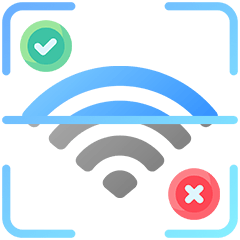Offline vs. Online QR Codes for Business Cards: What Is the Difference?
Thanks to QR codes, all it takes to exchange contact information today is a quick scan and a few taps on a smartphone. QR codes have revolutionized the way we share contact details, making traditional business cards smarter and more effective. With a simple scan, you can transfer your full contact details - including name, phone number, email, and more - directly into someone’s smartphone.

But which type of QR code is best for this purpose? Should you opt for an offline QR code or an online QR code? Each has its unique advantages but also comes with a bunch of drawbacks. The simple comparison table provided below will help you weigh your options. And if any bullet point doesn’t sound clear enough, don’t hesitate to click on it for a more detailed explanation.
Tip: Yohn.io’s free digital business cards for Apple/Google Wallet come with offline QR codes by default but premium users can switch to the online codes if they prefer (for as low as 10 € / year). Get a demo digital business card with QR code here.
OK, now first of all, go ahead and scan each of the QR codes provided at the top of the table to see the difference for yourself.
Feature | Offline QR Code | Online QR Code |
|---|---|---|
|
| |
Advantages |
|
|
Disadvantages |
|
|
Advantages of Offline QR Codes
Speed and Simplicity
Offline QR codes are designed for speed. Since they don’t rely on an Internet connection, the data is embedded directly within the code. This makes scanning and transferring information nearly instantaneous, which is especially helpful in environments where a reliable Internet connection isn’t guaranteed.
Work on All Smartphones
One of the biggest strengths of offline QR codes is their universal compatibility. Whether your contact is using an iOS or Android device, the scanning and data retrieval process is equally smooth.
Advantages of Online QR Codes
Updatable
Online QR codes link to web-hosted data, which means you can update the contact information or add branding elements like photos and logos at any time. This flexibility ensures your details are always current without needing to reprint or redesign the QR code.
Richer Data Capacity
Online QR codes can encode far more information than their offline counterparts. They can handle complex data types, such as profile photos, for example, without compromising scanning reliability.
Advanced Features
Online QR codes make extra features like scan analytics possible. These insights allow you to see when and where your code was scanned, providing valuable feedback for networking and marketing efforts.
Easy to Scan
Since there’s not much data encoded into the actual QR code (just the link to web-hosted data), online QR codes are quick to recognize and scan, even on lower-quality camera devices or with insufficient lighting.
Disadvantages of Offline QR Codes
Limited Data Capacity
While efficient, offline QR codes have a data ceiling. Trying to include too much information, such as high-resolution images or logos, can make the code overly complex and harder to scan. This limits their ability to showcase graphic elements effectively.
No Analytics
Because offline QR codes don’t interact with online platforms, there’s no way to track how often they are scanned or by whom. For professionals who want insights into engagement, this lack of analytics can be a significant drawback.
Disadvantages of Online QR Codes
Internet Dependency
The primary drawback of online QR codes is their reliance on an active Internet connection. If the person scanning your code has limited connectivity, the process may even fail entirely.
Slower Scanning Process
Since online QR codes redirect to a web link, they typically take longer to process compared to offline QR codes. This minor delay might not be ideal for fast-paced events or quick networking exchanges.
Android Workflow Challenges
On Android devices, online QR codes often download a .vcf file, which then needs to be manually imported into the contact list. This extra step can be a bit clunky compared to the seamless workflow on iOS.
Making the Right Choice for Your Business Card
The decision between offline and online QR codes ultimately depends on your priorities. If speed and reliability are crucial, especially in areas with poor Internet connectivity, offline QR codes are a solid choice. On the other hand, if you value flexibility, analytics, and the ability to update information easily, online QR codes might be the better fit.
Yohn.io’s premium digital business cards (currently available for as low as 10 € / year) offer you to choose between offline and online QR codes based on your needs. And hey, if you think you need two separate cards - one with an offline and one with an online QR code - simply let us know. We will generate both for you at the price of one. Just don’t tell anyone ;)

